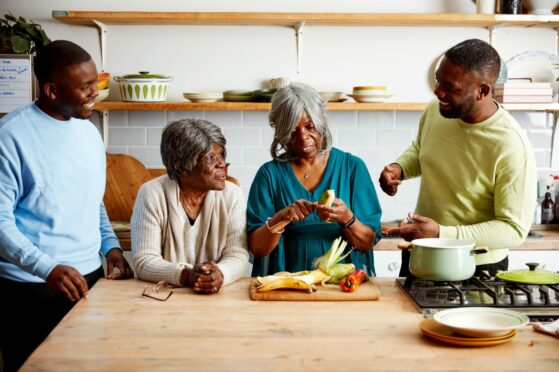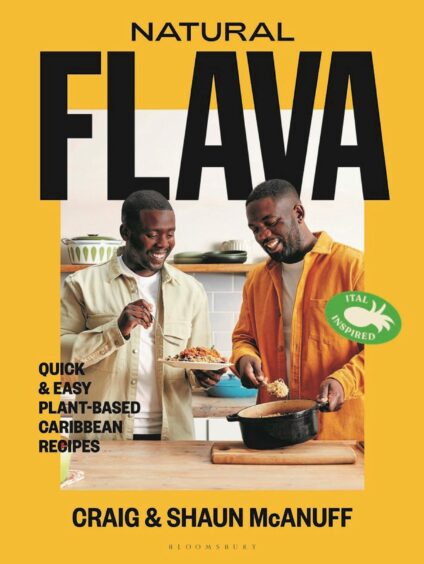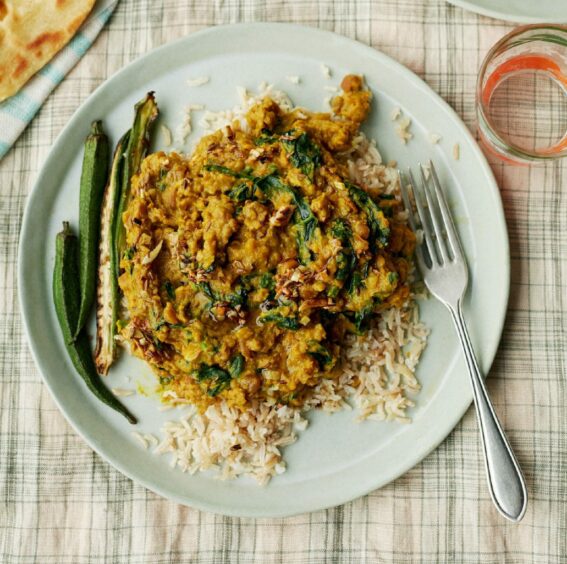
Shaun and Craig McAnuff – the brothers behind food sensation Original Flava, with over 160,000 followers on Instagram – admit vegan dishes weren’t a huge part of their childhood dinners.
Growing up in a Caribbean household in South London, meat was very much the main event but that’s shifted now with the duo experimenting more with plant-based foods – and their mum has even been a vegan since 2017.
Their new book is called Natural Flava, and Shaun dubs it “the first step into trying to draw people into a healthier, happier diet – because most of the Afro-Caribbean community are predominantly meat-eating”.
He wants to show people how to strike a balance, saying: “We’re not trying to tell people to be vegans. We’re not militant, because I don’t think that’s the best way to introduce things to people. Only two or three times a week – change your diet, that’s the best way to start.”
The Caribbean diet might be meat-heavy, but the McAnuffs found it easy to put together plant-based recipes from their culture. Growing up, explains Craig, “vegetables were used in the sides – but they were very flavourful sides. It was always an eclectic range of different vegetables, rather than just Brussels sprouts.”
A big inspiration for many of the recipes is the Rastafari movement, with one section of the book dubbed “Ital inspired” (a belief that food should be grown locally and unmodified). Shaun calls them one of “the pioneers of vegan, plant-based foods”. Food is spiritual for Rastas, with Shaun saying: “It’s all about eating from the earth and looking after your body.”
Craig continues: “The Rastafarian movement is not just about the food – it’s about how to preserve Mother Nature, respecting the environment. That’s why they say the earth and everything that is birthed naturally is good for you, whether that is food, whether that is remedies. They always encourage to use what’s natural, so that was really the pivoting inspiration for this book.”
Before releasing their first book in 2019, Original Flava, the brothers made a pilgrimage to Jamaica – and it’s the plant-based food they remember the most. “The best meal I ever had was a vegan meal in Jamaica,” Craig reminisces. “It was incredible. It was different vegan dishes on one plate – stewed peas, pumpkin, slaw, curried tofu, rice and peas – all in one bowl. We’ve taken that excitement and vibrancy, and those Caribbean ingredients to what we’re doing now.”
Caribbean ingredients are certainly front and centre in the book, and the brothers could wax lyrical about them for hours. Plantain recipes run throughout the book, but you won’t just see it as a fried side dish. It’s in stews, lasagnes, desserts, hummus – there’s even a recipe for making your own plantain milk.
“We come from a Caribbean community where we’re so used to these ingredients, so we wanted to show it in a new light,” explains Craig. “Plantain’s quite a loved vegetable – delicious, it’s in the banana family, it’s sweet but still starchy. There are so many different ways (to cook it), and we wanted to show our community and the world how you can use different Caribbean-based vegetables, and everyday vegetables as well, with added flavour.”
The “F” word – flavour – is something both the McAnuffs return to time and time again, but they also can’t ignore the benefits they’ve both felt from eating more plant-based meals.
Neither of the brothers are fully vegan (although Shaun was for a year in 2017) but they’ve increasingly been incorporating more plant-based meals into their diets. Craig says they’re now “happier in ourselves.”
Shaun says the difference in their mother’s health – she became a vegan when Shaun started experimenting – is stark.
“She had type two diabetes, high blood pressure but managed to control it and eradicate it as well,” he says. “For her health, it’s done wonders. She lost so much weight, her skin’s glowing, she’s happy. She’s really loving it.”
For the brothers, food has always been about family and it couldn’t be clearer in their new book, with pictures of their children throughout (Shaun has a two-year-old son and Craig has two-year-old twin girls).
There are three years between Shaun, the oldest, and Craig, and being business partners and siblings has its ups and downs. Shaun says the main thing they argue about is “what recipes we make next” – which is certainly a nice problem to have.
Trini split pea dhal with spinach & okra
Serves: 4
You’ll need
- 350g dried split peas
- 1.7L water
- 1 medium onion, very finely chopped
- 1 scotch bonnet pepper, deseeded and very finely chopped
- 2tbsp ground turmeric
- 1tsp ground cumin
- 1tsp ground pimento (allspice)
- 1tbsp mango chutney, plus extra to serve
- Handful of spinach
- 3tbsp vegetable oil
- 4 garlic cloves, chopped
- 1tbsp cumin seeds
- 2 bay leaves
- 8 okra, sliced lengthways
- Salt and freshly ground black pepper
Method
- Firstly, wash and drain the split peas two or three times, until the water runs clear. Add them to a large pot with the water and bring to the boil. Now season with the onion, scotch bonnet, turmeric, ground cumin, pimento, mango chutney and salt and black pepper to taste. Simmer for 40 minutes until the peas are tender.
- Use a stick blender to blend until mushy but not completely smooth. Add a little more salt and black pepper to taste, stir in the spinach to wilt, take off the heat and allow to rest – the liquid will soak into the peas, thickening it. Add a little more hot water if it needs loosening.
- In a frying pan, heat the oil and add the garlic, cumin seeds and bay leaves. Fry for three to four minutes until sizzling and fragrant, being careful not to burn them, then dash them into the curry.
- In the same frying pan, pan-fry the sliced okra and serve alongside the curry, with rice and flatbreads. Serve extra mango chutney and hot pepper sauce on the side.
Natural Flava: Quick And Easy Plant-Based Caribbean Recipes, Bloomsbury, £22, out now

Enjoy the convenience of having The Sunday Post delivered as a digital ePaper straight to your smartphone, tablet or computer.
Subscribe for only £5.49 a month and enjoy all the benefits of the printed paper as a digital replica.
Subscribe



 © PA
© PA